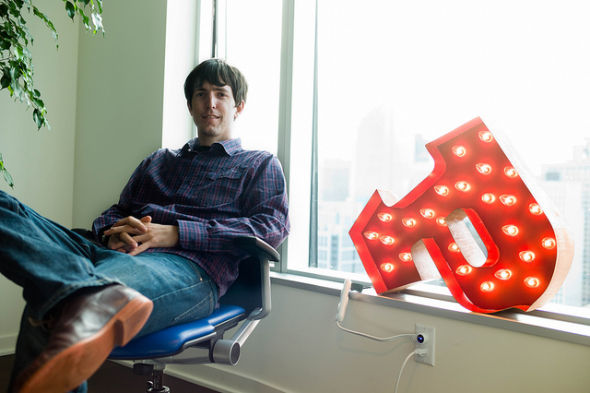 本周一(4月9日),Facebook以10亿美元的价格收购了照片分享应用Instagram,此举可称为社交网络界开创了先河。由于即将上市,Facebook目标远大,钱袋鼓鼓,它的收购计划不可能就此收手。那么私密社交网络Path是否值得考虑呢?毕竟这家小型社交网络公司的创办者是Facebook的前高管。
本周一(4月9日),Facebook以10亿美元的价格收购了照片分享应用Instagram,此举可称为社交网络界开创了先河。由于即将上市,Facebook目标远大,钱袋鼓鼓,它的收购计划不可能就此收手。那么私密社交网络Path是否值得考虑呢?毕竟这家小型社交网络公司的创办者是Facebook的前高管。
Facebook首席执行官马克•扎克伯格想让大家看到的是,通过收购来实现增长不是Facebook的唯一方法。他在自己的Facebook记事本上写道:“如果还要收购,我们也并不打算再大买特买。”不过,Facebook对收购并不陌生。从公司的发展史上就能看到,它已收购过几家公司,包括文件托管服务公司drop.io和位于阿姆斯特丹的软件设计公司Sofa——这是Facebook收购Instagram之前最近的一次收购。这些交易多数都是所谓的“人才并购”(acq-hires),即收购的动力既来自对产品的垂涎,也有对人才的垂青。
不过扎克伯格的这番表态并不意味着他不会继续展开几次高调的收购。位于爱尔兰的博彩网站Paddy Power已经开出了赌盘,项目就瞄准Facebook的下一个收购目标(签到服务公司FourSquare是最受青睐的对象,赔率是4比1)。但是,硅谷著名预言家、金融分析公司Discern Analytics预测部门负责人保罗•萨弗却表示,那些规模稍大的公司,比如主打照片分享的网站Pinterest“可能会打心眼里觉得,它们(凭自己的力量已经实现了增长),自己才应该是Facebook垂青的对象”。而市场研究公司Second Shares中专攻社交网络公司的金融分析师卢•肯纳则表示,如果Facebook打算加强视频领域的特色功能,其他候选对象可能包括了视频服务公司Tout或Machinima。
而与此同时,假设Facebook与Path联手,那就意味着Path的首席执行官戴夫•莫林(Dave Morin)将和自己的前老板再次聚首。2010年离开Facebook创办自己的企业之前,莫林一直主导Facebook的大型项目开发。他在Facebook时的主要任务是不断扩大Facebook的疆土——因此他率领开发了Facebook Connect和Facebook Platform这样的应用,它们为更多用户和应用开发者打开了闸门。而在Path,他的目标则是让人际互动更亲密,因此将用户的好友数限制在150名。Path公司没有立即回应采访要求。
Path在很短的时间里实现了稳步增长。这款应用的最新动态包括,与耐克公司(Nike)的产品实现整合,帮助监测锻炼的各种数据并与朋友分享。Path公司宣称,这一整合运用拥有200万位客户,并称他们中70%的人每周都会继续使用。业内人士向“商业内幕”网站(BusinessInsider)透露,扎克伯格和他的团队对Path“深感恐惧”。这种说法真假难辨,但是,和Instagram一样,Path拥有很多Facebook的特性,但它一开始就是为移动设备开发的,而不是在移动大潮蔚然成风后再努力适应。
Facebook现在正全力以赴准备下月上市,资金似乎不是Facebook关注的目标,但它拒绝就此发表评论。但是对莫林来说,钱可能也不是他最在意的,毕竟有报道称,去年他曾拒绝了谷歌公司(Google)1亿美元的出价。
而Facebook打算拿Path怎么办则完全是另一个问题了。它可以关了它,复制它此前收购对象的做法,设法拿回被(这些曾经的竞争对手)大量夺走的用户使用时间(Path声称它能与Facebook和平共处。比如,这两家公司已将联系人进行了整合)。或者它可以让Path独立成长,一如它对Instagram的承诺。但萨弗表示:“其中的奥妙在于,作为一家已经规模
不小的公司,怎么能同时保持小规模呢?聪明的做法就是让像Path这样的公司继续独立成长。”
可以确定的是,Path很可能将继续保持对用户的吸引力。正像萨弗表示的,它已经拥有富有吸引力的资产了,包括基于其设计优势而拥有的令人垂涎、精巧优美的专利。那还需要和Facebook达成交易吗? “恐怕只有两个人知道这个问题的答案,”萨弗称。“不过这也正是这个故事更加引人入胜的原因所在。”
Facebook's acquisition of photo-sharing app Instagram for $1 billion on Monday set a new precedent for the social network. With lofty goals and gobs of cash in the wings thanks to its impending initial public offering, Facebook may not be done shopping. What about Path, the small-scale social network started by one of Facebook's own?
CEO Mark Zuckerberg gave the impression that growth by acquisition would not be the company's modus operandi, writing on his Facebook timeline, "We don't plan on doing many more of these, if any at all." But the company is no stranger to buyouts, having acquired several properties in its history already, including file hosting service drop.io and Amsterdam-based software design company Sofa -- one of Facebook's latest acquisitions before yesterday. Many of these deals have been so-called acq-hires, motivated as much by the personnel as the products involved.
That doesn't mean there aren't a few more high-profile deals ahead. Ireland-based gambling website Paddy Power is already taking bets on Facebook's next buyout. (Check-in service Foursquare is the favorite at 4 to 1.) But Paul Saffo, a Silicon Valley futurist and managing director of foresight for Discern Analytics, says those slightly bigger companies, like the runway hit photo-sharing site Pinterest, "might be too attached to the idea that they've got a shot [at growing on their own]." Other options might be video services Tout or Machinima, if Facebook wanted to bolster its features in that category, says Lou
Kerner, a financial analyst focusing on social web companies at Second Shares.
A hypothetical tie-up with Path, meanwhile, would be a reunion for CEO Dave Morin and his former employer. Morin led major projects at Facebook until he left in 2010 to launch his own startup. While Morin worked at Facebook to expand its reach -- heading such developments as Facebook Connect and Facebook Platform, which opened the floodgates to more users and app developers -- his goal at Path has been to make interaction more intimate, restricting users to 150 friends. Path did not immediately respond to a request for comment.
Path has grown steadily in a short period. The app's latest update includes integration with Nike+ (NKE) products, which help monitor and share workout information with friends. The company says it has 2 million users and claims 70% of them return every week. Sources have told BusinessInsider that Zuckerberg and his team are "afraid" of Path. That may or may not be true, but like Instagram, Path shares many of Facebook's features but was developed for mobile devices, rather than adapted to them after the fact.
Money doesn't seem to be an object for Facebook, which declined to comment, heading into its sky-high market debut next month. But money may also not be the concern from Morin, who reportedly turned down $100 million offer from Google (GOOG) last year.
What Facebook would do with Path is another question entirely. It could shut it down, like it has acquisitions past, and try to take back the hours of user engagement that had been siphoned off. (Path claims it can coexist with Facebook. The two companies already have contacts integrations, for instance.) Or it can let Path grow separately, like it has pledged with Instagram. "The trick is, even if you're a big company, how do you keep it small?" says Saffo."The smart thing would be to let something like Path grow."
What's certain is that Path is likely to remain attractive. It already has potentially lucrative assets, including coveted and sophisticated patents that Path likely has because of its design edge, says Saffo. A deal with Facebook though? "There are probably only two people who know the answer to that," says Saffo. "But it is definitely what makes the story all the more interesting."
 本周一(4月9日),Facebook以10亿美元的价格收购了照片分享应用Instagram,此举可称为社交网络界开创了先河。由于即将上市,Facebook目标远大,钱袋鼓鼓,它的收购计划不可能就此收手。那么私密社交网络Path是否值得考虑呢?毕竟这家小型社交网络公司的创办者是Facebook的前高管。
本周一(4月9日),Facebook以10亿美元的价格收购了照片分享应用Instagram,此举可称为社交网络界开创了先河。由于即将上市,Facebook目标远大,钱袋鼓鼓,它的收购计划不可能就此收手。那么私密社交网络Path是否值得考虑呢?毕竟这家小型社交网络公司的创办者是Facebook的前高管。
